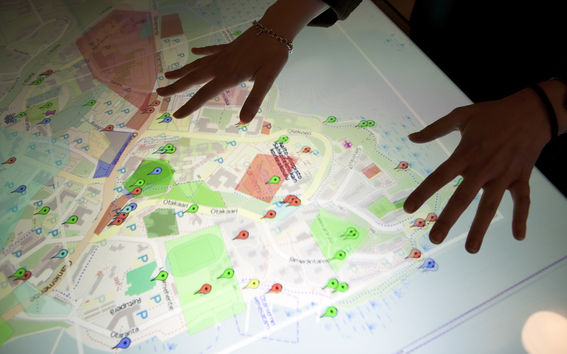Energy Efficiency and Systems

In the Energy Efficiency and Systems research group, research is focused on energy generation and energy consumption systems. The scale of these systems ranges from single buildings to industrial energy systems and continental energy networks.
Despite the variety of application areas, common research methods provide opportunities for close cooperation between the group's researchers, thus providing the base of knowledge needed for top-level research. This knowledge base also provides possibilities for international research cooperation.
Efficient energy use and indoor climate in buildings, energy- and material-efficient technologies, process concepts and process integration in industry, and optimal energy systems of communities are the key research knowledge in the group. The basis of the research is in the increasing complexity of energy systems and the need to reduce their environmental impact.
The main research tools are different types of analysis, simulation and optimisation methods used in computer software and programs. These computer programs include both leading commercial software and programs created by the group. Experimental methods are also used, focusing on efficient integration of renewable energy in buildings, on drying technology and on measuring the indoor-air quality and performance of energy systems in buildings.
The societal and economic impact of energy technologies is studied by applying system analysis tools to search for ways to integrate renewable energy and to reduce greenhouse gas emissions in energy systems of both industrialised countries like Finland and developing countries. The tools that are utilised include life-cycle approaches, carbon footprint calculation, (primary) energy efficiency analysis, exergy analysis, production simulation and multi-objective optimisation, GIS analysis, investment analysis as well tools for multicriteria decision making. Research is done within national Finnish research programs, the EU’s Horizon programme and in other international research programmes.
The group also studies large transformations of energy systems to reach carbon-neutrality. Medium- and long-term energy system transformations are studied with energy system models, such as EnergyPLAN and EnergyPRO as well as in-house models of electricity markets and demand-side management. The focus of research is on modelling and exploring future developments of national energy systems, city-level heating systems and international electricity markets.
Modern energy systems research focuses on finding optimal solutions for ensuring a comfortable and healthy indoor environment while minimising energy use. This is achieved both by utilising computer simulation and optimisation and by conducting experimental research on novel technologies.
Energy systems of buildings are studied both experimentally and with the help of simulation and optimisation. The main focus areas are building energy efficiency and its optimisation, energy solutions for low-energy buildings and indoor air quality & thermal conditions.
Energy systems research is also studied at the community level by applying simulation, optimisation and system analysis tools. In densely populated areas, balancing the production and usage of energy over multiple buildings is more beneficial than concentrating on individual buildings. Research includes the development optimal strategies for energy efficiency, environmental impact and economics.
Building energy efficiency is studied by utilising building simulation tools such as IDA ICE and TRNSYS in conjunction with single- or multi-objective optimisation methods, e.g. genetic algorithms. Energy solutions for low-energy buildings are associated with passive or zero-energy buildings. Such buildings and their energy systems are studied in a five-year research project funded by the Academy of Finland, both with the computational methods mentioned earlier and with a semi-empirical nearly zero-energy building emulator located in the research group’s laboratory.
Acceptable air quality and thermal conditions are important in maintaining healthy indoor environments. These are influenced by both the HVAC systems of the building and by the building itself. Thermal environment is researched through CFD simulations and by performing measurements in an HVAC test chamber located in the research group’s laboratory. Special equipment, such as a custom thermal manikin and a multi-gas analyser, are used in the measurements.
Multi-objective optimisation tool – MOBO
In collaboration with VTT, the research group has developed a multi-objective optimisation tool called MOBO. MOBO can be coupled with virtually any (simulation) program producing the objective function values. MOBO was initially designed for building performance optimisation, but it can also be used for many other applications. The user can give discrete or continuous variables, make algebraic formulas of optimisation parameters and set constraints. MOBO features several different optimisation algorithms, including evolutionary, deterministic, hybrid, exhaustive and random algorithms. The user is advised to read the manual that comes with the MOBO installation.
In order to download MOBO and/or its source code, please participate in this survey and fill in your contact details to receive a download link.
Key personnel
In energy technology for industry, the main research areas are energy- and material-efficient technologies, process concepts and process integration. Research in energy- and material-efficient technologies covers industrial drying processes and integrated trigeneration of heat, power and cooling.
Experimental research concentrates on drying technology. The research group’s laboratory is equipped with three different dryers: a vacuum contact dryer for drying different types of veneers and other materials; a drum dryer for drying biomass and other solid materials; and a rotary vacuum evaporator to evaporate various materials.
Energy- and material-efficient production technologies and concepts are also studied with the aim of improving the efficiency of industrial sites through process integration. This research includes the development of novel computational tools and measurement approaches for overall efficiency to ensure that multiple aspects of efficiency are accounted for.
Key personnel






